A lengthy public hearing in Oakland Monday afternoon and evening sought to parse out the benefits or drawbacks of exporting coal through a new shipping center under construction at the old Oakland Army Base in West Oakland.
With nearly 600 speakers signed up to speak at the beginning of the meeting, public comment lasted well into the night. Representatives of the companies, environmental groups, unions, community organizations and public officials weighed in on the proposal.
The issue of coal exports coming through the new terminal at the former army base came to light earlier this year when the state of Utah invested $53 million in the proposed project in Oakland. In July, a letter sent to Mayor Libby Schaaf confirmed coal was one commodity Terminal Logistics Solutions was considering exporting through the new terminal.
The U.S. Army turned the base over to the city more than a decade ago and the city took years to come up with a development plan, at times considering a movie studio, an auto dealership and an amusement park for the property.
Finally, a project was awarded to California Capital and Investment Group, an Oakland development company headed by prominent developer Phil Tagami, to develop the Global Trade and Logistics Center, which would include a new rail and marine terminal. Terminal Logistics Solutions would be a lessee at that terminal.
Among the many speakers against the project Monday was former Oakland Mayor Jean Quan, who helped broker the initial development deal.
"The approval process would have been very very different if Phil Tagami said 'we're going to do coal,'" she told the council this evening. She said the environmental review process and funding decisions would have gone very differently if the possibility of coal exports had been discussed as the deal was moving forward.
Local
The arguments against exporting coal were twofold: Opponents argued that not only would the local community be impacted by dust from transporting coal by rail, but that the entire world would be impacted by the continued promotion of burning coal as an energy source.
Quan argued that pollution in China can spread to California, citing a recent study by the University of California at Berkeley. The Bay Area is also especially vulnerable to sea level rise from climate change.
"We're either going to save the planet together or we're going to lose the planet together," Quan said.
The environmental concerns were raised by several organizations, including Earthjustice, the Sierra Club, San Francisco Baykeeper, Communities for a Better Environment and the West Oakland Environmental Indicators Project.
West Oakland already struggles with air pollution. Hundreds of trucks pass through the Port of Oakland daily, making it one of the most polluted neighborhoods in the Bay Area. Asthma levels in West Oakland are twice the rate of other areas of Alameda County, county public health director Muntu Davis said.
But officials from Terminal Logistics Solutions said the companies could take steps to mitigate pollution from coal dust by covering rail cars and building a facility that wouldn't allow the spread of harmful
particulates.
That was convincing for some community members. Washington Burns, executive director of the Prescott-Joseph Center for Community Enhancement in West Oakland, said he worked in West Oakland to reduce pollution from diesel exhaust by advocating for better emissions standards rather than against industry in general.
For coal, he thought the mitigation efforts proposed by the company would work.
"If TLC does what it says it's going to do" in keeping the railcars and facility covered, he said, "I feel there is no danger to the residents of Oakland."
Others focused on the jobs promised by project leaders. A letter from Stice Block, a law firm representing one of the developers, said the project would create an estimated 2,800 construction jobs, 2,000 permanent waterfront jobs, and 4,225 regional jobs.
Pastor Kevin Hope from the Acts Full Gospel Church supported the plan for that reason.
"They've done more than their due diligence to minimize the liabilities that come with the transport of coal," he said. The project could be a boon for the at-risk youth he works with through the church who badly need jobs, he said.
Attorneys for the project even went so far as to imply the city lacked the power to prevent coal exports at the terminal, that the council could run afoul of interstate commerce regulations or could just be reneging on a deal where development is underway, seeking to micromanage the terminal.
But the meeting clearly demonstrated broad opposition to the plan. Council President Lynette Gibson McElhaney said early on it appeared that the speakers were split, with about half the speakers at the meeting for the project and half against, and had them take turns speaking. But the pro-coal speakers fizzled out about three hours into the meeting while opponents went on for hours longer.



